top of page



Using Large Language Models (LLMs) and Other AI Tools to Gather and Analyze Political Elite Networks
Our ECPR Joint Session Workshop will take place in
Innsbruck, Austria, April 7-10, 2026
In Innsbruck, we bring together scholars to discuss optimal approaches, data sources, and validation strategies. The goal is to enable large-scale comparative projects, and expand analysis beyond narrowly defined elites, and from simple to multiplex or signed networks.
While this is a closed workshop, we will post relevant materials here on this website, so follow us on Bluesky and X and subscribe to our LLM-polnet mailing list by sending an email to: franziska.keller@unibe.ch.
More information to follow...
bottom of page

